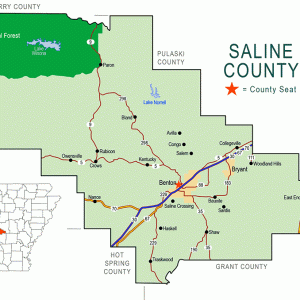calsfoundation@cals.org
Congo (Saline County)
Congo is an unincorporated community in Salem Township located approximately six miles north of Benton (Saline County). Primarily a rural community, it is best known for the Congo Mercantile store that served as the heart of the community for decades beginning in the 1920s.
Some of the earliest settlers of the Congo area were William and Jesse Wills, Joseph Scott, Willis Pipkin, William Duncan, and Isaac Ally, who arrived in the 1830s. Prior to the Civil War, the McCray, Goodwin, and Vandergrift families settled in the area. Residents of the community farmed the rich soil, raised cattle and hogs, and hunted and fished along the Saline River. Other than agriculture, no other major industries developed in the sparsely settled area until after the Civil War. Asa Perry operated a store, cotton gin, gristmill, and blacksmith shop closer to the North Fork of the Saline River.
A local post office was established in 1882 in the area at Tatumville, near the present-day Avilla (Saline County) community five miles north, but another post office was needed nearer the population growth to the south. A post office was established in 1893 at the home of longtime resident Henry H. McCray, a Confederate veteran. In the first few applications for the post office, each name was rejected by the U.S. Postal Service in Washington DC. McCray’s daughter, Flora, listened intently to the frustration created by the denials of post office names. She had recently studied Africa in school and offered the name “Congo” to her father, who immediately supplied that name on the next application, which was accepted. Residents also organized a Methodist church, Congo Methodist Church. The structure doubled as the Congo School until a new church building was constructed across the road. The Congo School merged with the Bryant School District in the early 1900s.
By the 1880s, a large influx of immigrants, primarily from Germany and Switzerland, settled in the Avilla-Congo vicinity. One of these, John Storch, purchased eighty acres in 1883 on south side of Bland Trail and opened the Storch general merchandise store in 1888. In 1898, Storch bought out Asa Perry, and although no records state if all of Perry’s business efforts were moved, the gristmill was relocated to Storch’s property. The Congo Post Office relocated to the Storch store in 1898, with John Storch as postmaster, and remained there until a fire destroyed it in 1923. Afterward, the center of the Congo community was established approximately two miles to the east at the intersection of Steel Bridge and Congo-Ferndale Roads.
Herman August Maertens, the stepson of John Storch, is the person most associated with modern Congo. Maertens, a native German who had not yet become a naturalized U.S. citizen, was drafted for World War I service. He served in most of the major battles as part of the U.S. Marine Corps, Company C, Fifth Machine Gun Battalion attached to the U.S. Army’s Second Infantry Division. Upon returning to Saline County in 1920, Maertens opened his first business at the intersection of Congo and Steel Bridge Road. Maertens built his own business in 1921, known as Congo Mercantile. Congo Post Office was relocated to Congo Mercantile, and Maertens was appointed postmaster in 1924. When rural route delivery out of Benton began, the post office was discontinued in 1929. Maertens became a naturalized citizen in 1925.
Congo Mercantile became the center of activity of the Congo community. Comprising at least five buildings, it offered groceries, gasoline, automotive supplies, lumber, feed, plumbing and electrical supplies, farming equipment, seed, and clothing. Regular delivery routes served customers daily. All of the buildings and warehouses were spread across approximately five acres. In the 1980s, Congo Mercantile relocated its business to Interstate 30 in Benton and changed its name to Congo Stove Works. The name was later changed to Congo Fireplace and Patio.
The Congo community encompasses the Congo Methodist Church, Congo Masonic Lodge No. 743, and private residences. The old Congo Mercantile store structure became a private residence, and all warehouses came to be used by Congo Fireplace and Patio. The legacy of Congo Mercantile continues with Congo Fireplace and Patio in Benton, owned by Robert L. Maertens, son of August Maertens. Bryan Maertens, grandson of August Maertens, operates the store.
For additional information:
“Congo (Ark) Has an Odd Name.” Arkansas Gazette, May 22, 1966, p. 4E.
“Congo Country Store Combines Old and New.” Arkansas Gazette, December 11, 1957, p. 1B.
Krueger, Marlo B. “Storch-Maertens Family and Congo Stores: Part I.” The Saline 31 (Fall 2016): 29–50.
———. “Storch-Maertens Family and Congo Stores: Part II.” The Saline 32 (Spring 2017): 13–28.
“Serene, Uninterrupted Peacefulness Surrounds Life in Arkansas’ Congo.” Arkansas Gazette, September 14, 1960, p. 9A.
Anthony Rushing
Benton, Arkansas
 Saline County Map
Saline County Map 



Comments
No comments on this entry yet.